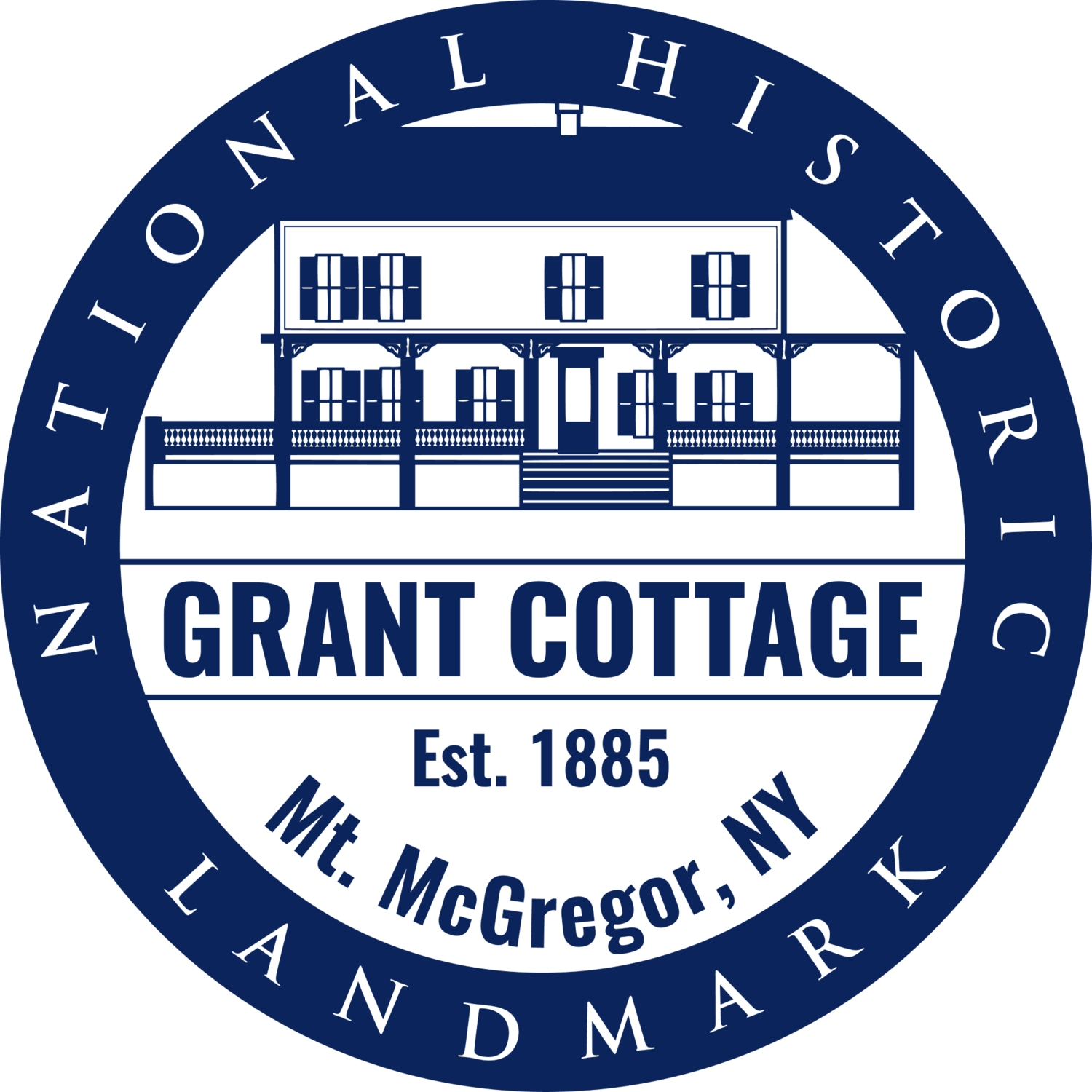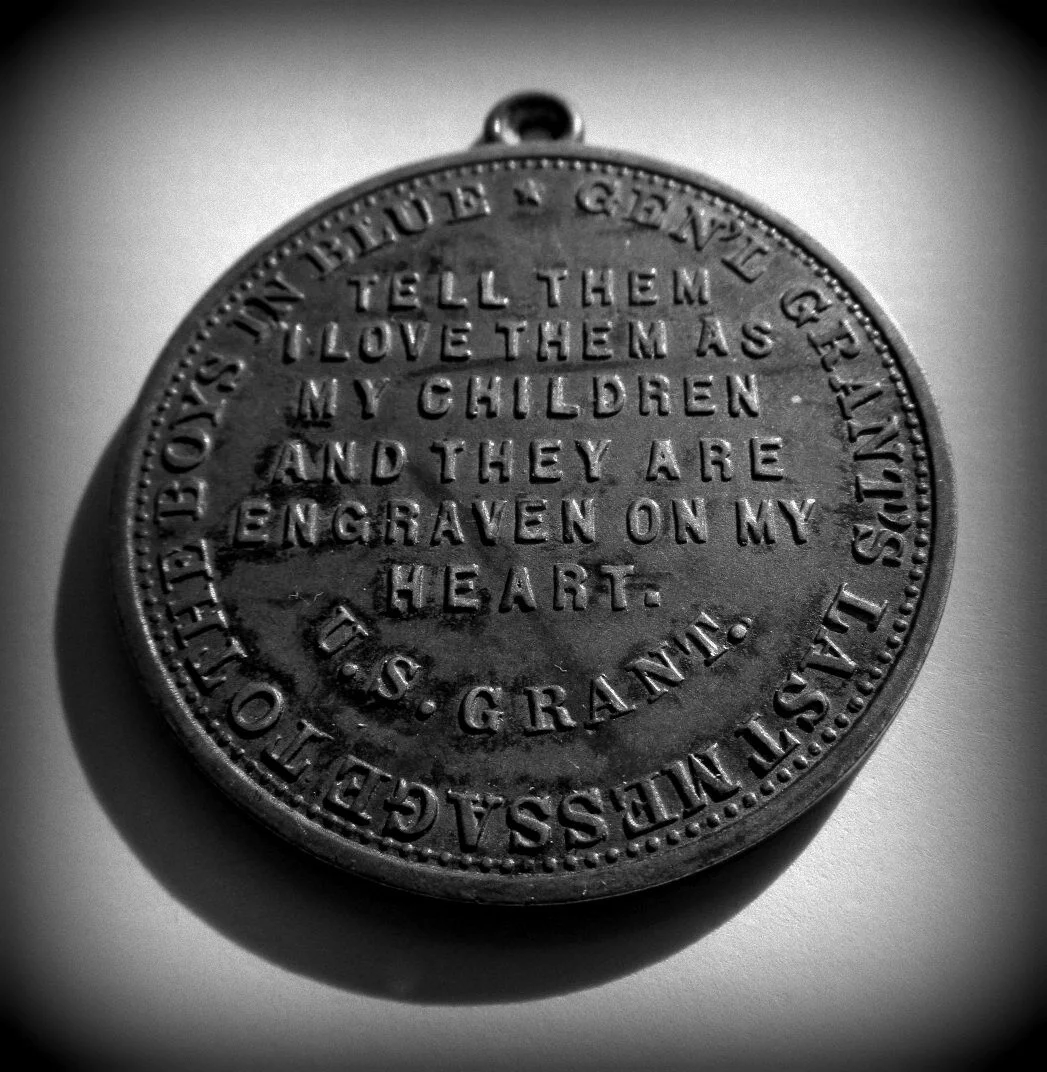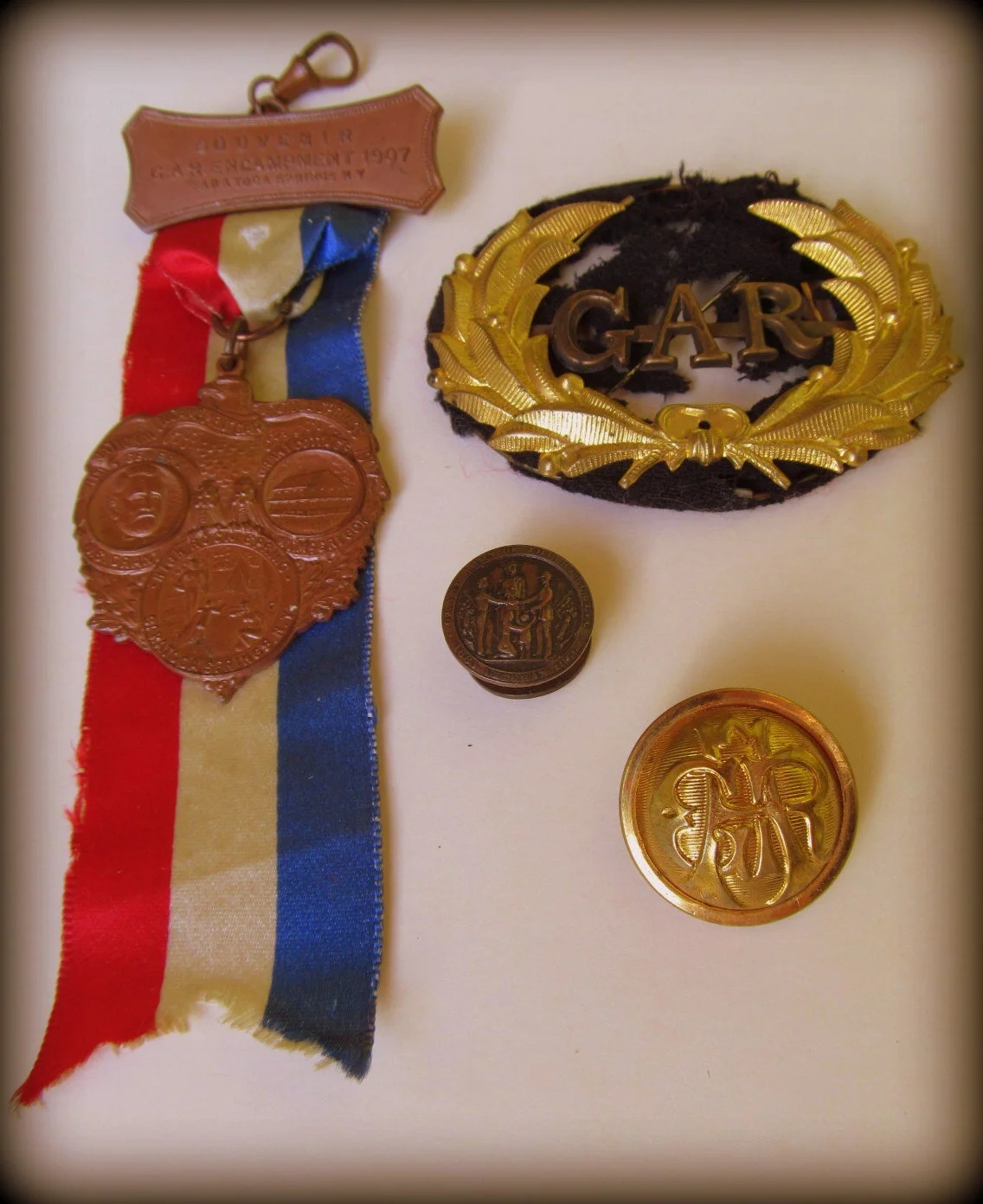Grand Army of the Republic souvenir medallion (This new artifact is on display at Grant Cottage Historic Site)
Ulysses S. Grant had a deep affinity and appreciation for the soldiers who served under him during the war. It was not to the generals but to these brave men that he credited the victory. The men had looked up to their commander with fatherly-like respect during the war, referring to the middle-aged Grant affectionately as the “Old Man.” In the years after the war, this paternal bond would only grow stronger as veterans began to gather for reunions and form powerful organizations like the Grand Army of the Republic.
The Grand Army of the Republic (G.A.R.) was formed in April 1866, eventually reaching its peak in membership and influence in the last decades of the 19th century. In the 1860s and 1870s General Grant was invited to and attended numerous veteran’s events and held honorary titles. The support of the veterans would play a significant role in Grant’s presidential elections. Understanding the hardships that many ex-soldiers faced after the war Grant supported veteran's care and was even known to discreetly slip money to veterans on the street on occasion.
It was shortly after Grant left the presidency in 1877 that he took the official step of joining the G.A.R. before departing on a world tour. Due to delays and other commitments, the intimate initiation ceremony took place in the office of his close friend George Childs at the Philadelphia Ledger on the morning of May 16. Grant joined the General George G. Meade Post No. 1 of Philadelphia, receiving his badge which “he wore frequently during his tour abroad, and at home on public occasions.” Veterans turned out in large numbers to see off their former commander as he embarked on his world journey the next day. To greet him on his return to Philadelphia in December 1879 would be over 5000 veterans who would create a memorable scene:
“The escort of General Grant… was probably one of the most thrilling and touching scenes ever witnessed in Philadelphia. A guard composed of members of Post 1 and representatives from all the city Posts acted as escort, and grouped around General Grant's carriage were a large number of color-bearers carrying tattered and battle-stained flags. Fireworks blazed at every point along the route. The streets were densely packed with an enthusiastic throng, and altogether the scene was one never to be forgotten by those who witnessed it.”
General Grant in the parade at Philadelphia December 1879.
Grant spoke to a large crowd of veterans gathered at the Academy of Music in Philadelphia, showing pride in their accomplishments since the war:
Gold G.A.R. badge presented to Gen. Grant in 1879.
“The ex-soldier has become the pioneer, not only of our land, but has extended our commerce and trade, and knowledge of us and our institutions to all other lands, and when brighter days dawn upon other nations — particularly those nations of the East — America will step in for her share of the trade which will be opened, and through the exertions of the ex-soldiers — the comrades, veterans — and, I might say, members of the Grand Army of the Republic… the one thing I want to impress on you is that we have a country to be proud of, to fight for and die for if necessary.”
It would be six years later while facing financial ruin and throat cancer, that Grant would share his final sentiments with his fellow veterans. On May 14, 1885, unable to attend Annual Encampment of the G.A.R. set to take place in Portland, Maine, Grant wrote the following moving letter:
“Tell the boys that they probably will never look into my face again, nor hear my voice, but they are engraved on my heart and I love them as my children. What the good Lord has spared me for is more than I can tell, but it is perhaps to finish up my book, which I shall leave to the Boys in Blue, and in which they cannot only see me but follow me in the acts in which they helped me.”
Two weeks later on Decoration Day (Memorial Day) veterans marched passed the Manhattan home of their ailing former commander in a moving display of sympathy and respect:
“…as those war-scarred veterans with uncovered heads and upturned faces for the last time looked upon the pallid features of their old chief, cheeks… were bathed in tears of manly grief. Soon they saw the rising the hand which had so often pointed out to them the path of victory. He raised it slowly and painfully to his head in recognition of their salutations… The column… passed, the hand fell heavily by his side. It was his last military salute.”
Throughout his final illness, General Grant received many letters of support and sympathy from veterans organizations as well as individual soldiers. Grant had become a beloved figure to his men. A couple of young girls sent Grant letters in his final months describing the affection and admiration of their veteran fathers for the general with one stating: “My papa was a soldier and loves you very much…” and another “My father was one of your old soldiers and he never tires of telling us of the ‘bravest soldier in the country.’”
Various G.A.R. relics.
Following their old commander’s struggle with his final illness only solidified the love and respect the veterans had for him. In late June, while Grant spent his final weeks at the Cottage on Mt. McGregor, the G.A.R. Annual Encampment sent their sympathies:
“…we tender to the distinguished comrade, soldier and statesman, General Ulysses S. Grant, our profound sympathy in his continued illness, and extend a soldier's greeting to our beloved Commander and Comrade, who has for months endured unspeakable agony with that characteristic fortitude that has challenged the admiration of the world."
Grant dictated a response to his son Fred to send to his beloved comrades in arms:
“General Grant directs me… to tender… to each one of the three hundred thousand veterans, his comrades, now represented at Portland, his thanks for their interest in his health and welfare. General Grant wishes to take this occasion to also thank them for their splendid services which have resulted in giving freedom to a race, peace to a continent, and a haven to the oppressed of the world."
Over the years Grant had not forgotten the Americans who had served so bravely, albeit for a cause he did not find worthy, and offered support for them. Confederate veterans groups sent letters of support to Grant in his final months and former Confederate General Simon Buckner would visit him in his final weeks on Mt. McGregor to express the sympathies of the veterans of the south.
Soon after the General passed away at Mt. McGregor, G.A.R. veterans descended on Mt. McGregor to Guard the Cottage in tribute to their fallen commander. Among the floral arrangements that arrived in preparation for the August 4th funeral on the mountain was a tribute from Grant’s own Meade Post No. 1 of Philadelphia. This delicate relic of colored flowers remains in the Cottage as a lasting tribute to the love and respect of the veterans for their General.
Floral tribute from Meade Post #1 G.A.R. on display in Grant Cottage.
Thousands of veterans took part in funeral ceremonies across the nation and paid tribute to the tomb constructed in Riverside Park in Manhattan. Grant’s son Fred recounted the effect these tributes had on the family:
“My mother, myself, and all our family feel deep gratitude for the delicate and touching attentions paid to General Grant's memory and to his tomb at 'Riverside'… Most touching of all to my mother are the loving tributes which are annually placed upon my father's tomb by his old comrades of the Grand Army of the Republic and by many others from all parts of the country which he served during his life.”
Modern-day veterans organizations grew out of the framework laid by the G.A.R. and continue to provide a place of camaraderie, mutual understanding, and support for veterans. Grant had never forgotten the sacrifice of those he commanded and the paternal responsibility he felt would remain to the very end, a commander with the love and care of a father.
G.A.R. Parade.
Sources:
The Papers of Ulysses S. Grant
Recollections of General Grant by George W. Childs
Grant’s Final Victory by Charles B. Flood












